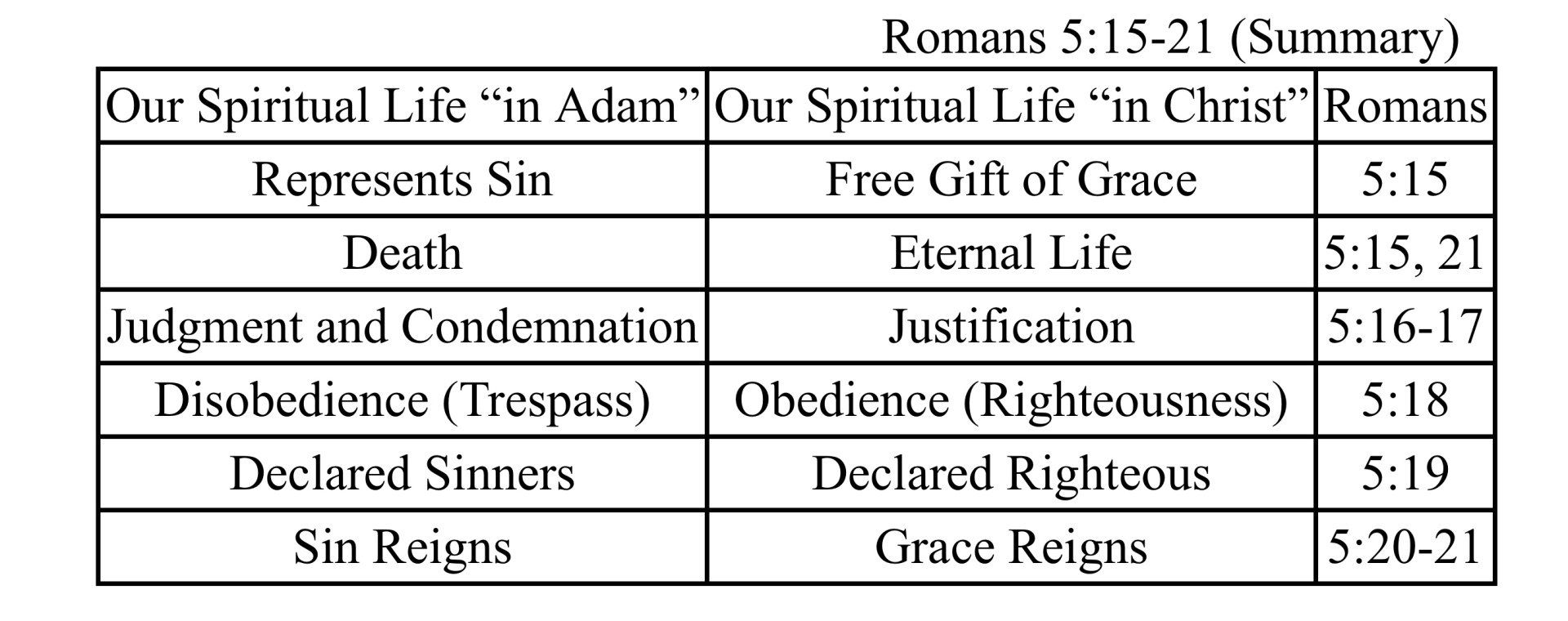
From Guilt to Grace
Romans 5:12-21
12 Therefore, just as sin came into the world through one man, and death through sin, and so death spread to all men because all sinned— 13 for sin indeed was in the world before the law was given, but sin is not counted where there is no law. 14 Yet death reigned from Adam to Moses, even over those whose sinning was not like the transgression of Adam, who was a type of the one who was to come.
15 But the free gift is not like the trespass. For if many died through one man's trespass, much more have the grace of God and the free gift by the grace of that one man Jesus Christ abounded for many. 16 And the free gift is not like the result of that one man's sin. For the judgment following one trespass brought condemnation, but the free gift following many trespasses brought justification. 17 For if, because of one man's trespass, death reigned through that one man, much more will those who receive the abundance of grace and the free gift of righteousness reign in life through the one man Jesus Christ.
18 Therefore, as one trespass led to condemnation for all men, so one act of righteousness leads to justification and life for all men. 19 For as by the one man's disobedience the many were made sinners, so by the one man's obedience the many will be made righteous. 20 Now the law came in to increase the trespass, but where sin increased, grace abounded all the more, 21 so that, as sin reigned in death, grace also might reign through righteousness leading to eternal life through Jesus Christ our Lord.
Brief Commentary:
5:12: Paul traces the origin of human sin to Adam in the garden in Eden (Genesis 3:1-7). Satan’s sin (pride; desiring to be like God) preceded humanity’s sin and occurred before the creation of the world (see Isaiah 14:12-14; Ezekiel 28:12-14).
Although Eve also sinned (Genesis 3:6; 3:16; 1 Timothy 2:14), Scripture teaches that Adam represented all human beings (Romans 5:12-21; cf. Hosea 6:7; 1 Corinthians 15:22). But is this fair or more importantly, biblical?
“The idea that one person’s actions represent the many” is known as corporate personality (Pate, 122). Scripture highlights a few examples of this teaching. First, the Priest of the Most High God Melchizedek received tithes from Levi through Abraham (but Levi had not been born yet: Hebrews 7:4-10).
Second, Achan’s sin represented the nation of Israel and was the primary reason for Israel’s defeat at Ai (Joshua 7:1-26). Third, our sins are responsible for putting Jesus on the cross, but Jesus died in our place (2 Corinthians 5:14-21). Jesus’ actions (perfect obedience, paying the penalty for our sins) represented us (Stott, 153-154). While some still object to this concept of corporate personality, perhaps this is due to our individualistic cultural experiences.
Did we inherit a sinful nature from Adam?
Scripture not only teaches that Adam represented us (corporate personality) in the garden of Eden, but that we also inherited a sinful nature from him as well. Which verses support this teaching? Let me share four passages.
First, Psalm 51:5 (“Behold, I was brought forth in iniquity, and in sin did my mother conceive me”) and Job 15:14 (What is man, that he can be pure? Or he who is born of a woman, that he can be righteous?) connect our sinful ways to the very beginning of a person’s life (conception, birth).
Second, Ephesians 2:3 says that we “were by nature children of wrath.” In other words, we were once objects of God’s wrath (by our very own nature). And what kind of nature did we have? If we were born innocent, then we should not be “by nature children of wrath.”
Third, Romans 3:9-20 teaches that we are totally corrupt from head to toe (cf. Jeremiah 17:9; Mark 7:14-23). Our total corruption is due to an inward propensity to sin that manifests itself in our thoughts, words, and deeds.
Fourth, Romans 5:15-21 teaches that we are spiritually “in Adam.” If a person is spiritually “in Adam,” then he/she is also a slave to sin (John 8:34-36; Romans 3:9; 6:6, 16-18). We didn’t become slaves to sin by merely following bad examples. Rather, we were born into “spiritual slavery.”
Death is a consequence of sin (Genesis 2:17; 3:3; Romans 6:23). Death means separation. Scripture teaches three kinds of death: physical (separation of the soul from body: 2 Corinthians 5:1-8), spiritual (humanity separated from God: John 3:1-8; Ephesians 2:1-5; Romans 3:9-20; 6:23), and eternal (separated from God for eternity: Revelation 2:11; 20:6, 14; 21:8 refer to it as the second death).
5:13-14: Paul is not saying that people were not judged guilty of sin because the law had not yet existed Rather, Paul is teaching that “when God’s Law is absent sin does not seem to be reckoned [because] the Law makes sin apparent and sharply defined.” (Hughes, 109).
People were still guilty of sin because “death [a consequence of sin] reigned from Adam to Moses.” (5:14) Their sin was different than Adam’s because Adam broke a direct command from God (Genesis 2:15-17). Adam “was a type” of Jesus (the one who was to come) in the sense that the one represents the many. Romans 5:15-21 further develops this teaching of corporate personality.
5:15-21: All human beings are either spiritually “in Adam” or “in Christ.” Paul compares Adam with Jesus and highlights six key differences (see chart below for a summary). First, Adam represents sin (trespasses God’s law) and Jesus represents the free gift of grace (5:15). Second, Adam brings death, but Jesus brings eternal life (implied 5:15; cf. 5:21). Third, Adam brings judgment and condemnation, but Jesus brings justification (5:16-17).
Fourth, Adam represents disobedience (one trespass) but Jesus represents obedience (one act of righteousness). Fifth, Adam’s sin made us sinners, but Jesus’ obedience made us righteous (5:19). Romans 5:19 is not teaching that we were born sinners (but see discussion below). Just as Christ-followers have been declared righteous, Boice notes that “the entire race was declared to be sinful because of Adam’s sin.” (604)
Sixth, sin reigns in Adam, but grace reigns in Jesus (5:20-21). For those who have not been spiritually born again (John 3:1-8), sin will continue to rule over their life. Sin is the master for those still living “spiritually in Adam.” On the other hand, grace reigns for those who are “spiritually in Christ.” We are saved by grace. We persevere by grace. Grace pervades our whole being.
The idea of that “grace abounded all the more” in response to sin is a significant truth. Boice explains that the verb “means to ‘abound,’ ‘overflow,’ or ‘have more than enough ‘excess’….Paul also adds the prefix hyper (we would say ‘super’), which gives the word the sense of ‘superabundance’ or ‘abundant excess.’” (618) What a marvelous way to teach that grace has reigned victoriously over sin (5:21).

Romans 5:12-21 is also a call for us to come to Jesus for our salvation. Take a moment. Reflect on your life. Are you spiritually “in Adam” or “in Christ?” If you are spiritually “in Adam,” then you are spiritually separated from God and stand judged and condemned for your sins.
But, it doesn’t have to be this way. By God’s grace, you can be saved. Jesus lived a perfect life of obedience and righteousness for us. He died in our place. You can receive forgiveness if you place your trust in Jesus’ death on the cross for your sins.
If you want to begin your new spiritual life “in Christ,” then please consider praying the following prayer for grace. (Prayers are not magical formulas, but rather, provide a spiritual framework for expressing our heart’s desire to God.)
A Prayer for Grace
Dear God, I know I stand judged and condemned. I can’t save myself. My goodness isn’t good enough. I need your grace. Thank you, Jesus, for dying on the cross for my sins. I place my faith in you to save me from my sins. Help me to worship and serve you. Your grace saves me. Your grace is sufficient for me. Amen.
I couldn’t wrap up our study on Romans 5:12-21 without highlighting the greatness of God’s grace. Here’s a brief summary of what the Scriptures teach about God’s grace:
• Grace through Jesus (John 1:16-17)
• Chosen by grace (Romans 11:6)
• Called by grace (Galatians 1:15)
• Saved by grace (Acts 15:11; Ephesians 2:8-9; Romans 5:15-17)
• Grace victoriously reigns over sin (Romans 5:20-21)
• Live under grace (spiritual union w/Christ) (Romans 6:14-15)
• Justified by grace (Romans 3:24; Titus 3:7)
• Forgiven by grace (Ephesians 1:7)
• Stand in grace (Romans 5:2)
• Continue in grace (Acts 13:43; 1 Corinthians 15:10)
• Persevere by grace (2 Corinthians 12:9)
• Strengthened by grace (2 Timothy 2:1; Hebrews 13:9)
• Receive grace through prayer (Hebrews 4:16)
• Spiritual gifts by grace (Romans 12:3-6; 1 Peter 4:10)
• Grow in grace (2 Peter 3:18)
• Grace given to the humble (James 4:6)
• Set our hope (for salvation) on grace (1 Peter 1:13)
• Grace is glorious (Ephesians 1:6)
Aren’t these truths awesome? Pretty amazing, right? Now you know why Paul referred to God’s grace in this passage as “superabundance” or “abundant excess.” Grace reigns!
Reflection
1. Human beings have a “theological solidarity” with Adam (Jewish culture: corporate personality). So, when Adam sinned, we sinned with Adam. Agree or disagree? Explain.
2. Do you believe all human beings were born with a sinful nature? Which verses would you use to support your belief?
3. Read the chart (above) that compares Adam and Jesus. Which truth(s) are most important to you and why? How does these truths impact your relationship with God?
4. How do these truths (see chart above) encourage you to proclaim the gospel? Perhaps this week you can be more intentional with PRISM (proclaim, relationships, invitations, spiritual conversations, movement) in light of one of your “Fab Five.”
5. What does it mean that “sin reigned” and “grace reigned?”
6. How can the truths of Romans (in general) impact our personal and corporate worship?
